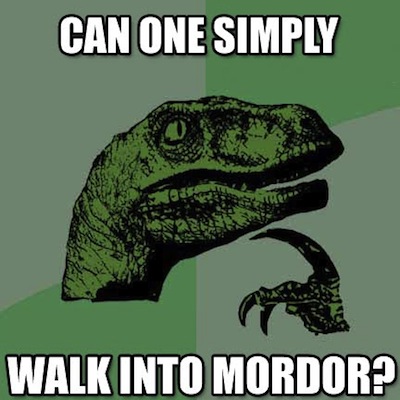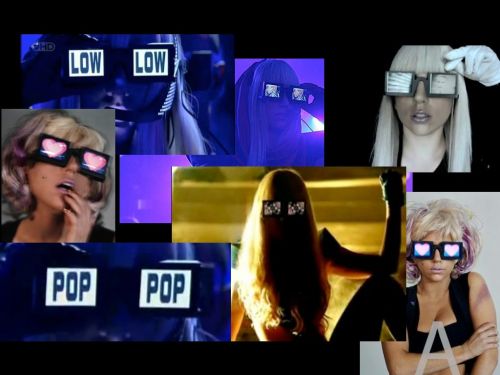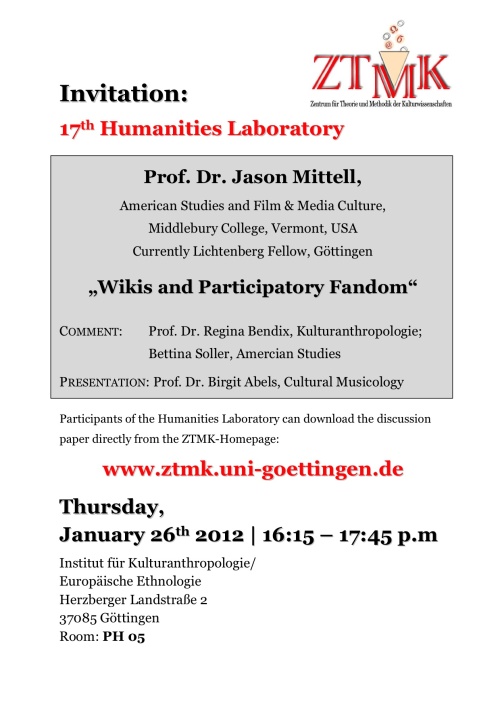An interview with me on the subject of memes, conducted by Manuel Behrens, appears in today’s Hannoversche Allgemeine Zeitung as part of a full-page spread on Boromir, Philosoraptor, Admiral Ackbar, and Rage Comics. True story! Check it out here: Was sind eigentlich Memes? (The interview, “Jeder kann mitmachen,” is at the bottom of the page.)
Tag: popular culture
Object-Oriented Gaga and the Nonhuman Turn
A while back, I posted the CFP for a conference on “The Nonhuman Turn in 21st Century Studies” to be held at the Center for 21st Century Studies at the University of Wisconsin-Milwaukee, May 3-5, 2012 (the original announcement is here). The lineup of invited speakers, in case you haven’t seen it, is very impressive:
Jane Bennett (Political Science, Johns Hopkins)
Ian Bogost (Literature, Communication, Culture, Georgia Tech)
Wendy Chun (Media and Modern Culture, Brown)
Mark Hansen (Literature, Duke)
Erin Manning (Philosophy/Dance, Concordia University, Montreal)
Brian Massumi (Philosophy, University of Montreal)
Tim Morton (English, UC-Davis)
Steven Shaviro (English, Wayne State)
In addition to these speakers, there will also be several breakout sessions at the conference. And, as luck would have it, I will be presenting in one of them, as the paper I proposed on Lady Gaga and the role of nonhuman agency in twenty-first century celebrity has been accepted by the conference organizers! I am honored and excited to have the chance to speak in such distinguished company, and I very much look forward to the conference. In the meantime, here is the abstract for my talk:
Object-Oriented Gaga: Theorizing the Nonhuman Mediation of Twenty-First Century Celebrity
Shane Denson, Leibniz Universität Hannover
In this paper, I wish to explore (from a primarily media-theoretical perspective) how concepts of nonhuman agency and the distribution of human agency across networks of nonhuman objects contribute to, and help illuminate, an ongoing redefinition of celebrity personae in twenty-first century popular culture. As my central case study, I propose looking at Lady Gaga as a “serial figure”—as a persona that, not unlike figures such as Batman, Frankenstein, Dracula, or Tarzan, is serially instantiated across a variety of media, repeatedly restaged and remixed through an interplay of repetition and variation, thus embodying seriality as a plurimedial interface between trajectories of continuity and discontinuity. As with classic serial figures, whose liminal, double, or secret identities broker traffic between disparate—diegetic and extradiegetic, i.e. medial—times and spaces, so too does Lady Gaga articulate together various media (music, video, fashion, social media) and various sociocultural spheres, values, and identifications (mainstream, alternative, kitsch, pop/art, straight, queer). In this sense, Gaga may be seen to follow in the line of Elvis, David Bowie, and Madonna, among others. Setting these stars in relation to iconic fictional characters shaped by their many transitions between literature, film, radio, television, and digital media promises to shed light on the changing medial contours of contemporary popularity—especially when we consider the formal properties that enable serial figures’ longevity and flexibility: above all, their firm iconic grounding in networks of nonhuman objects (capes, masks, fangs, neckbolts, etc.) and their ontological vacillations between the human and the nonhuman (the animal, the technical, or the monstrous). Serial figures define a nexus of seriality and mediality, and by straddling the divide between medial “inside” and “outside” (e.g. between diegesis and framing medium, fiction and the “real world”), they are able to track media transformations over time and offer up images of the interconnected processes of medial and cultural change. This ability is grounded, then, in the inherent “queerness” of serial figures—the queer duplicity of their diegetic identities, of their extra- and intermedial proliferations, and of the networks of objects that define them. Lady Gaga transforms this queerness from a medial condition into an explicit ideology, one which sits uneasily between the mainstream and the exceptional, and she does so on the basis of a network of queer nonhuman objects—disco sticks, disco gloves, iPod LCD glasses, etc.—that alternate between (anthropocentrically defined) functionality and a sheer ornamentality of the object, in the process destabilizing the agency of the individual star and dispersing it amongst a network of nonhuman agencies. As an object-oriented serial figure, I propose, Lady Gaga may be an image of our contemporary convergence culture itself.
Jason Mittell: “Wikis and Participatory Fandom”
There are few technological developments that had more of a visible impact on participatory culture in the 2000s than the wiki. Although the software was designed for small-scale and local uses, wikis have emerged as a major tool used by internet users on a daily basis. From the world’s most popular encyclopedia, Wikipedia, to hundreds of specialized sites serving a vast array of subcultures and groups, wikis have become one of the hallmark tools of the participatory internet, or Web 2.0. This article will outline the development of wikis as a software platform and the cultural rise of Wikipedia before considering a range of participatory practices tied to one of the most widespread uses of wikis: as a tool for online fandom.
Bowie Turns 65: Pop-Star Iconicity and the Serialization of Self
[youtube http://www.youtube.com/watch?v=eBvR08RD_-I]
David Bowie turns 65 today, and among the various birthday tributes and other pieces written for the occasion is this article by David Hudson, appearing in mubi.com’s “The Daily” column: “Bowie @ 65“. Most interesting, to me, is Hudson’s identification of “Bowie’s #1 lesson in staying power: Create a persona and then kill it off with the next one.” Hudson is right, I believe, to single out what amounts to a principle of seriality as the open secret of Bowie’s success — a principle taken up, as Hudson also correctly observes, by Michael Jackson, Madonna, and Prince in the 1980s. As I’ve recently argued, it’s precisely this principle — with Bowie as a direct influence, no less — that Lady Gaga has begun adapting to the changed medial parameters of twenty-first century convergence culture (see here for a summary). I’ll have more to say about this sort of serialized celebrity soon, but for now: Happy birthday to one of the original progenitors of pop stardom qua serial media remix!
CFP: Comics and Politics
Comics and Politics
7th Annual Conference of the Gesellschaft für Comicforschung (Society for Comics Studies)
at the Institute for Media Culture Studies, University of Freiburg
September 27-29, 2012
comfor2012.comicgesellschaft.de
We invite abstracts for each of the following three parts of the conference: Talks on the main conference topic, Comics and Politics (1); reports on ongoing research projects for any aspect of comics studies for open workshop sessions (2); as well as posters on any topic concerning comics studies (3).
1. Call for Papers on Comics and Politics
Comics interact with politics and the political in several obvious ways: As a format of artistic expression, as a sometimes popular, alternative or marginalized genre, and not least as an element of new media, comics feature specific political dimensions that are not always sufficiently covered by concepts developed for the description of politics in other art forms. While several studies have dealt with particular instances, the special role of comics as archive, player, playing field, and constituent of political processes has rarely been examined under a common perspective.
The 7th Annual Conference of the Gesellschaft für Comicforschung thus invites contributions from different disciplines and starting points that deal with any of the many constellations of comics and politics. Some of these views might, for instance, connect to recent thoughts on an ‘ethical turn’ in cultural studies, or equally to contemporary questions and theories from pictorial studies.
Contributions might address any of the following three broad subjects, among others:
I. Comics Activism: Criticism and Propaganda
Political elements in comics are most conspicuous where they are dealt with topically and explicitly: In depictions, evaluations, negotiations and interventions of political issues. Such comics come in many different forms, from propaganda with a clear political, religious, or cultural agenda, through satirical, subversive, and socially critical work, up to and including alternative media and grey publications. Along with other fictional or documentary comics on contemporary or historical political issues, they also add to an archive of political topics and discourses. Some prominent examples here might connect to Postcolonial or Gender Studies, which have sometimes been somewhat neglected in existing comics studies.
Contributions to this area might, for instance, deal with contexts of publication, habits of reading, dimensions of social effect, as well as topical content and delivery of political concepts in comics. Some objects for research might include cultural treatments of political processes (such as comics ‘about’ the Third Reich, the Cold War, 9/11, etc.); as well as comics that are actively engaged in political debate (such as comics ‘in favour of’ Christian fundamentalism, alternative energy sources, equal rights movements, etc.); but also and not least comics that are foremost conceived and produced as parts of official or alternative political discourses (such as comics ‘in’ politics: the report of the 9/11-commission, military informational and instructional material, etc.).
II. Comics under Control: Censorship and Comic Codes
From a different angle, comics appear as objects of political processes: Where they have been regarded dominantly as children’s and youth literature, they have variously come under the gaze of different concepts of education and socialization, and have been discussed as paradigmatic ‘new media’ – both in apocalyptic warnings of destructive media or as positive vehicles of integration. In other contexts, comics have been described as subversive and alternative forms of communication: Underground Comix and other formats often deliberately play with a performative self-marginalization, employing ostentative obscenity, phantasmagorical depictions of violence, pornography and other echoes of content excluded in controlled media.
Contributions to this area might, for instance, deal with explicit calls for censorship (such as those connected to Wertham’s Seduction of the Inncocent or the Comics Code Authority) through circumstantial pressure on forms and contents (such as modified imagery in recent Barks- and Hergé-publications) up to texts that offer self-reflective commentary on their own limits (perhaps most prominently in Maus’ differentiated self-commentary on the limits and discomforts of its animal allegories). In all of these, political control of media can also be read as a political view of media: In these discourses, comics are first described as harmful, deviant, dangerous, or as productive, useful, educational, in order to justify calls for their restriction or propagation. Can Wertham’s condemnation of comics also count as one of the first detailed, if controversial, analyses of comic books and panel structures?
III. Comics as a Political Art Form: Aesthetics and Ideology
Beyond the explicit treatment of the political in comics, and the explicit treatment of comics in political discourse, many further questions concern the political dimension of specific aesthetics, imageries, and media dispositives in comics. Connecting to models of cultural criticism (from Benjamin and Adorno through to Didi-Huberman, Rancière, or Badiou, or particular theories of pictorial ideology by the likes of Oudart or Heath, and many more), contributions to this area might deal, for instance, with basic constituents of comics and their mimetic conventions, structural effects, processes of narrativization and fictionalization, body imaginations and genre traditions. The very division of the sensual realm into writing and image can no less avoid political relevance than the many issues surrounding a just and justifiable depiction of realities and intentions.
This opens up questions about the formal semantics of the art form, some of which are again dealt with explicitly in comics. Are comics systematically, or are particular comics especially, politically resistant, by the very means of their artistic practice? Or does their connection to mass production and mass media ground them in politically affirmative mainstream cultures? Which concepts might be employed to describe such a basic political dimension of comic book aesthetics?
2. Call for Papers for the Open Workshop
Beyond the discussion of each year’s special topic, the German Society for Comics Studies aims to further co-operation and dialogue in all areas of comics research. The 7th Annual Conference will therefore re-introduce an open workshop format that allows researchers to present and gather feedback on on-going projects within comics studies in all stages of development, and without any thematic restrictions – not limited to comics and politics. The invitation stands for colleagues in all phases of academic careers to discuss any projects on which they are currently working, be it as BA, MA or PhD candidates, established institutional researchers, or free scholars.
3. Call for Papers for the Poster Section
The third part of the conference will, for the first time, present a poster section. Ongoing as well as concluded research projects on all topics – not limited to comics and politics – can be presented on posters. Posters will be on exhibition for the whole time of the conference, and a special poster session will give the authors an opportunity to explain and discuss their work in detail.
We invite short abstracts (1) for 30-minute talks on any topic concerning comics and politics, or (2) for 20-minute presentations in the Open Workshop, or (3) for contributions to the Poster Section.
Please clearly mark your abstract as (1), (2) or (3), and include a short biography and bibliography. Abstracts are welcome by email, as pdf or rtf files. Deadline: February 1, 2012.
For further information, please see comfor2012.comicgesellschaft.de .
Contact:
Dr. Stephan Packard Juniorprofessor für Medienkulturwissenschaft Albert-Ludwigs-Universität Freiburg Werthmannstraße 16 79098 Freiburg Tel. +49-761-203-97842 stephan.packard@medienkultur.uni-freiburg.deThank You
This is just a quick thank you note to everyone involved with last week’s two overlapping events: the theme week on “Popular Seriality” at In Media Res, and the conference we hosted on “Cultural Distinctions Remediated: Beyond the High, the Low, and the Middle.”
First, thanks to my co-curators at In Media Res: Frank Kelleter, Ruth Mayer, Jason Mittell, Andreas Jahn-Sudmann, and Daniel Stein. Because of them and the external commenters, the theme week — in addition to being a lot of fun — provided lots of food for thought and continuing conversations. Thanks also to Karen Petruska from In Media Res for guiding us through the process of setting up the theme week. And while the theme week is officially over, everything will remain online (here) and open for further comments and discussions. So if you’ve got something to say about the topic of popular seriality, it’s not too late!
Thanks as well to everyone who made the conference “Cultural Distinctions Remediated” such a success: our keynote speakers Jason Mittell (who, in case you missed it, has posted his talk here) and Lynn Spigel; fellow speakers Regina Schober, Bettina Soller, Andreas Jahn-Sudmann, Florian Groß, and Christina Meyer; my co-organizers Ruth Mayer, Vanessa Künnemann, and Florian Groß; and our great assistants Felix Brinker, Svenja Fehlhaber, and Hannah Pardey! Thanks also to our sponsors: the US Embassy in Berlin, the Deutsche Gesellschaft für Amerikaforschung, the Deutsche Forschungsgemeinschaft, Campus Cultur, and the Freundeskreis der Leibniz Universität Hannover. Thanks, finally, to everyone who attended, asked stimulating questions, and helped generate interesting discussions!
Popular Seriality
Just a quick reminder that the theme week on “Popular Seriality” is underway over at In Media Res. The first two posts are up, and there’s been some lively discussion. So check it out and spread the word!
Here, again, is the lineup of presenters/curators for the week, along with our titles:
Monday, Dec 12: Frank Kelleter “That Soothing Balm of Latent Discontent: MAD MEN Unstresses the 21st Century” Tuesday, Dec 13: Shane Denson and Ruth Mayer “Plurimediality and the Serial Figure” Wednesday, Dec 14: Jason Mittell“Serial Characterization and Inferred Interiority” Thursday, Dec 15: Andreas Jahn-Sudmann
“TV Series, Metaseriality and the Very Special Episode” Friday, Dec 16: Daniel Stein
“Authorizing Alternative Authorships: The Popular Serialities of Superhero Blockbuster Spoofs”
“Popular Seriality” Theme Week at In Media Res
 In the week of December 12-16, 2011, members of the DFG Research Unit “Popular Seriality — Aesthetics and Practice” will be organizing a theme week, itself entitled “Popular Seriality,” over at In Media Res. Each day’s contribution, consisting of a video clip of up to three minutes accompanied by a short essay of 300-350 words, is designed to serve as a conversation starter aimed at involving a broad audience in discussion of key topics relating to our current research.
In the week of December 12-16, 2011, members of the DFG Research Unit “Popular Seriality — Aesthetics and Practice” will be organizing a theme week, itself entitled “Popular Seriality,” over at In Media Res. Each day’s contribution, consisting of a video clip of up to three minutes accompanied by a short essay of 300-350 words, is designed to serve as a conversation starter aimed at involving a broad audience in discussion of key topics relating to our current research.
To participate in the discussion, you will need to register beforehand at In Media Res. (Registration is simple, but it can sometimes take a while for user accounts to be generated, so it is recommended that you register early.)
Here is the lineup of presenters/curators for the theme week, along with our tentative titles:
Monday, Dec 12: Frank Kelleter “That Soothing Balm of Latent Discontent: MAD MEN Unstresses the 21st Century” Tuesday, Dec 13: Shane Denson and Ruth Mayer “Plurimediality and the Serial Figure” Wednesday, Dec 14: Jason Mittell“Serial Characterization and Inferred Interiority” Thursday, Dec 15: Andreas Jahn-Sudmann
“TV Series, Metaseriality and the Very Special Episode” Friday, Dec 16: Daniel Stein
“Authorizing Alternative Authorships: The Popular Serialities of Superhero Blockbuster Spoofs”






